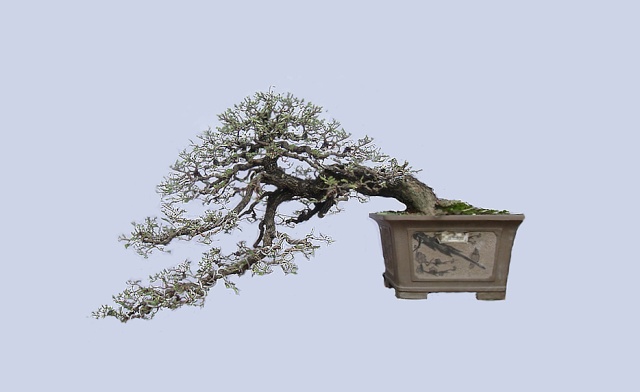tamarind bonsai tree
+18
Bhanu
Pola
gman
fM
Ka Pabling
john5555leonard
dorothy7774
Jerry Meislik
JuanquiM
Khaimraj Seepersad
Budi Sulistyo
Rob Kempinski
hirow08
daiviet_nguyen
ogie
Bonsai_Dan
Ravi Kiran
bigbabol
22 posters
Page 1 of 2
Page 1 of 2 • 1, 2 
 tamarind bonsai tree
tamarind bonsai tree
this work has just prepared, according to me it is a beautiful bonsai tree, do you think so? 

now let watch and give me some suggestions






best regards
bigbabol

now let watch and give me some suggestions






best regards
bigbabol

bigbabol- Member
 Re: tamarind bonsai tree
Re: tamarind bonsai tree
Hey Bigbabol,
Without hesitation this is clearly the best tamarind bonsai I have ever seen. Work of art and no two ways about it. Congrats to you on such a beautiful creation. This is also one of the rare tamarinds that has been styled as a semi-cascade and very well done.
Ravi
Without hesitation this is clearly the best tamarind bonsai I have ever seen. Work of art and no two ways about it. Congrats to you on such a beautiful creation. This is also one of the rare tamarinds that has been styled as a semi-cascade and very well done.
Ravi

Ravi Kiran- Member
 Re: tamarind bonsai tree
Re: tamarind bonsai tree
Hi Bigbabol,
Very intersting tree & ramification,yhanks fot sharing
Keep well my friend,
Alex
Very intersting tree & ramification,yhanks fot sharing
Keep well my friend,
Alex

ogie- Member
 Re: tamarind bonsai tree
Re: tamarind bonsai tree
Hi there 3B,
I have seen your works elsewhere. I like this one too. How long has this bonsai been in your possession?
I am originally from an eastern province in South Vietnam, there had been a lot of those trees. Huge ones.
And they have been all straight trees, no cascades. But I must say, it looks nice in this style too.
Best regards.
I have seen your works elsewhere. I like this one too. How long has this bonsai been in your possession?
I am originally from an eastern province in South Vietnam, there had been a lot of those trees. Huge ones.
And they have been all straight trees, no cascades. But I must say, it looks nice in this style too.
Best regards.
daiviet_nguyen- Member
 Re: tamarind bonsai tree
Re: tamarind bonsai tree
Wow! I believe this is also the first ever semi cascade Tamarind I've seen. 
Excellent work!
Thanks for sharing!

Excellent work!
Thanks for sharing!
hirow08- Member
 Re: tamarind bonsai tree
Re: tamarind bonsai tree
That's a great tree- especially for a Tamarind.
I see two problems I'd try to fix - the double apex and the first lower branch.
With some pruning and a bit of time this might solve the issues I see. I feel the tree needs more negative space.
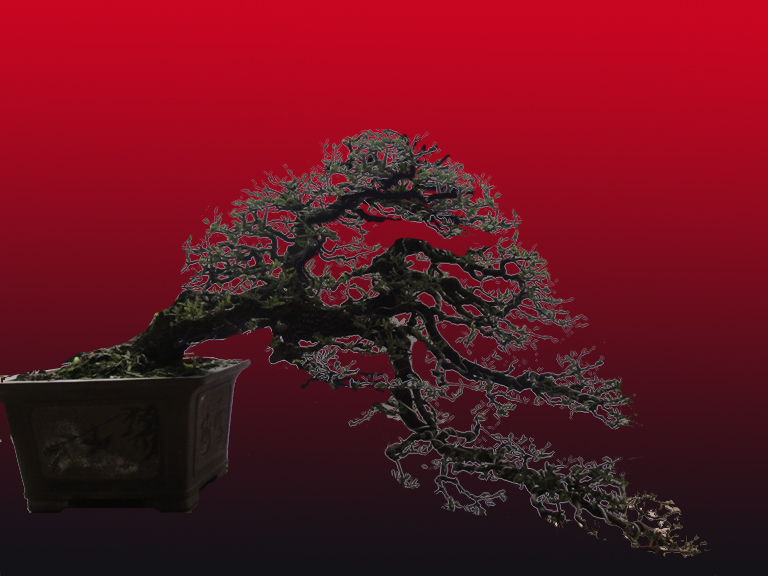
I see two problems I'd try to fix - the double apex and the first lower branch.
With some pruning and a bit of time this might solve the issues I see. I feel the tree needs more negative space.


Rob Kempinski- Member
 Re: tamarind bonsai tree
Re: tamarind bonsai tree
Hi Bigbabol,
Your tamarind is nice. Is it from air layering?
Budi
Your tamarind is nice. Is it from air layering?
Budi
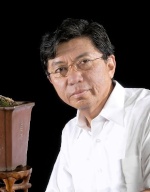
Budi Sulistyo- Member
 Re: tamarind bonsai tree
Re: tamarind bonsai tree
Fascinating, never seen a semi-cascade Tamarind.
Wow, you have patience. all that wiring.
Thanks for showing.
Khaimraj
Wow, you have patience. all that wiring.
Thanks for showing.
Khaimraj
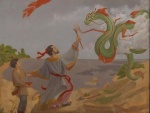
Khaimraj Seepersad- Member
 Re: tamarind bonsai tree
Re: tamarind bonsai tree
Great ramification, also my first semi-cascade tamarind. Great composition.
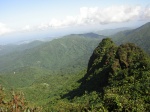
JuanquiM- Member
 Re: tamarind bonsai tree
Re: tamarind bonsai tree
Great Tamarind. A very difficult material to get with movement.
I agree with Rob in that the double apex is a point to work on.
Jerry
I agree with Rob in that the double apex is a point to work on.
Jerry
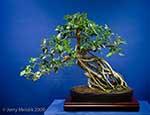
Jerry Meislik- Member
 Re: tamarind bonsai tree
Re: tamarind bonsai tree
thanks all, your suggestions is useful with me and I would like to acknowledge your help 
to Budi: no it is not an air layering, it is grown from seed for more 15 years
to daiviet: you can find your question at diendancaycanhvietnam.com
to Alex:


to others:

to Budi: no it is not an air layering, it is grown from seed for more 15 years
to daiviet: you can find your question at diendancaycanhvietnam.com
to Alex:
to others:



bigbabol- Member
 Re: tamarind bonsai tree
Re: tamarind bonsai tree
Hi All,
I have gone through the comments and have enjoyed the same. I have also liked the fantastic virtuals of Dorothy and Rob and they are exceptional. I also understand what some of you are saying when you say that the tree has double apex and hence needs to be addressed to 'MAKE THE TREE LOOK BETTER'
Here are my thoughts on the topic and I say these words with utmost care and would also like to clarify right at the beginning that I mean no disregard or disrespect to anyone. Having said that here is what I feel or rather want to ask my fellow IBC members.
Why is a double apex not visually appealing? I do understand that in all conventional and classical styling it is a single apex which has been advocated. I have nothing against a single apex it looks great without a doubt. However my query is that why is a double apex not visually appealing. It could be for one of the two reasons in my opinion
1. All bonsaists including me have been trained to appreciating a single apex tree and hence anything outside of this framework in unacceptable as meaningful bonsai.
2. Rules or no rules, tradition or no tradition the tree with two apexes is not good to look at. This statement could be ideally be made by the untrained in bonsai who come with no framework of bonsai rules or traditions.
Personally speaking, I like this tree as it is with two apexes. Having said that I'd once again reiterate that a single apexed tree in a classical styling also looks EQUALLY (not more not less) good.
While I say this I recall an article by Walter Pall on Bonsai viewing which appeared in AoB a couple of years ago where he says something like this "When a seasoned bonsaist looks at a Bonsai (most of them) they try and fit the image of the tree into one of the many styles and forms that they have seen. Should the tree in question not fit into any of the form silhouettes they have seen, then the tree is deemed bad or imperfect while that need not be the case".
I am also reminded of John Naka when he says "DO NOT MAKES YOUR TREES LOOK LIKE BONSAI BUT MAKE YOUR BONSAI LOOK LIKE TREES". I guess that what the late Master is saying is very similar to what Walter has also been saying.
I would round off by saying that I am unsure if this should be discussed in this thread or not. Should the moderators feel so, pls advice me what to do. Till then do share your thoughts on what I've said...
Ravi
I have gone through the comments and have enjoyed the same. I have also liked the fantastic virtuals of Dorothy and Rob and they are exceptional. I also understand what some of you are saying when you say that the tree has double apex and hence needs to be addressed to 'MAKE THE TREE LOOK BETTER'
Here are my thoughts on the topic and I say these words with utmost care and would also like to clarify right at the beginning that I mean no disregard or disrespect to anyone. Having said that here is what I feel or rather want to ask my fellow IBC members.
Why is a double apex not visually appealing? I do understand that in all conventional and classical styling it is a single apex which has been advocated. I have nothing against a single apex it looks great without a doubt. However my query is that why is a double apex not visually appealing. It could be for one of the two reasons in my opinion
1. All bonsaists including me have been trained to appreciating a single apex tree and hence anything outside of this framework in unacceptable as meaningful bonsai.
2. Rules or no rules, tradition or no tradition the tree with two apexes is not good to look at. This statement could be ideally be made by the untrained in bonsai who come with no framework of bonsai rules or traditions.
Personally speaking, I like this tree as it is with two apexes. Having said that I'd once again reiterate that a single apexed tree in a classical styling also looks EQUALLY (not more not less) good.
While I say this I recall an article by Walter Pall on Bonsai viewing which appeared in AoB a couple of years ago where he says something like this "When a seasoned bonsaist looks at a Bonsai (most of them) they try and fit the image of the tree into one of the many styles and forms that they have seen. Should the tree in question not fit into any of the form silhouettes they have seen, then the tree is deemed bad or imperfect while that need not be the case".
I am also reminded of John Naka when he says "DO NOT MAKES YOUR TREES LOOK LIKE BONSAI BUT MAKE YOUR BONSAI LOOK LIKE TREES". I guess that what the late Master is saying is very similar to what Walter has also been saying.
I would round off by saying that I am unsure if this should be discussed in this thread or not. Should the moderators feel so, pls advice me what to do. Till then do share your thoughts on what I've said...
Ravi

Ravi Kiran- Member
 Re: tamarind bonsai tree
Re: tamarind bonsai tree
Ravi Kiran wrote:Hi All,
I have gone through the comments and have enjoyed the same. I have also liked the fantastic virtuals of Dorothy and Rob and they are exceptional. I also understand what some of you are saying when you say that the tree has double apex and hence needs to be addressed to 'MAKE THE TREE LOOK BETTER'
Here are my thoughts on the topic and I say these words with utmost care and would also like to clarify right at the beginning that I mean no disregard or disrespect to anyone. Having said that here is what I feel or rather want to ask my fellow IBC members.
Why is a double apex not visually appealing? I do understand that in all conventional and classical styling it is a single apex which has been advocated. I have nothing against a single apex it looks great without a doubt. However my query is that why is a double apex not visually appealing. It could be for one of the two reasons in my opinion
1. All bonsaists including me have been trained to appreciating a single apex tree and hence anything outside of this framework in unacceptable as meaningful bonsai.
2. Rules or no rules, tradition or no tradition the tree with two apexes is not good to look at. This statement could be ideally be made by the untrained in bonsai who come with no framework of bonsai rules or traditions.
Personally speaking, I like this tree as it is with two apexes. Having said that I'd once again reiterate that a single apexed tree in a classical styling also looks EQUALLY (not more not less) good.
While I say this I recall an article by Walter Pall on Bonsai viewing which appeared in AoB a couple of years ago where he says something like this "When a seasoned bonsaist looks at a Bonsai (most of them) they try and fit the image of the tree into one of the many styles and forms that they have seen. Should the tree in question not fit into any of the form silhouettes they have seen, then the tree is deemed bad or imperfect while that need not be the case".
I am also reminded of John Naka when he says "DO NOT MAKES YOUR TREES LOOK LIKE BONSAI BUT MAKE YOUR BONSAI LOOK LIKE TREES". I guess that what the late Master is saying is very similar to what Walter has also been saying.
I would round off by saying that I am unsure if this should be discussed in this thread or not. Should the moderators feel so, pls advice me what to do. Till then do share your thoughts on what I've said...
Ravi
thank you- Ravi, I cant expess what I would like to say, because my English is bad but I can understand what you said, they are my mine too, it is happy to read your opinions and I want to say that: I will never cut any apex. Why? because I love that- 2 apex, no rules, no tradition but nature and love what Ravi said
thanks again Ravi- my friend
bigbabol

bigbabol- Member
 Re: tamarind bonsai tree
Re: tamarind bonsai tree
Ravi,
perhaps we should also see the tree in full leaf, and then make a discussion ?
Plus remember all, this is not a hologram, just a flat image and I doubt any real suggestions of design improvements could be made ?????
Khaimraj
perhaps we should also see the tree in full leaf, and then make a discussion ?
Plus remember all, this is not a hologram, just a flat image and I doubt any real suggestions of design improvements could be made ?????
Khaimraj

Khaimraj Seepersad- Member
 tamarind bonsai tree
tamarind bonsai tree
Hi,
This is indeed a nice and interesting tree specially for a tamarind in a cascade style.
Bigbabol, you said "that you will never cut any apex", Its your tree so the final decision is yours but since you asked for suggestions, a lot of members gave theirs, I like the ones from Rob, its by the book,and I like more that of Dorothy,.
This the beauty of this forum,you may not agree with the suggestions but others who will read it will certainly learn something, and in similar situations,might follow the the suggestions of Rob and Dorothy.
On the other hand, you presented your tamarind in the leafless stage so the the double apex became obvious., For fruiting and flowering trees, rules are not so strict , what is important is for the trees to show their lovely fruits or flowers. I believe this tamarind can stay as is.
Nice work Bigbabol
This is indeed a nice and interesting tree specially for a tamarind in a cascade style.
Bigbabol, you said "that you will never cut any apex", Its your tree so the final decision is yours but since you asked for suggestions, a lot of members gave theirs, I like the ones from Rob, its by the book,and I like more that of Dorothy,.
This the beauty of this forum,you may not agree with the suggestions but others who will read it will certainly learn something, and in similar situations,might follow the the suggestions of Rob and Dorothy.
On the other hand, you presented your tamarind in the leafless stage so the the double apex became obvious., For fruiting and flowering trees, rules are not so strict , what is important is for the trees to show their lovely fruits or flowers. I believe this tamarind can stay as is.
Nice work Bigbabol

Ka Pabling- Member
 Re: tamarind bonsai tree
Re: tamarind bonsai tree
Ka Pabling wrote:Hi,
This is indeed a nice and interesting tree specially for a tamarind in a cascade style.
Bigbabol, you said "that you will never cut any apex", Its your tree so the final decision is yours but since you asked for suggestions, a lot of members gave theirs, I like the ones from Rob, its by the book,and I like more that of Dorothy,.
This the beauty of this forum,you may not agree with the suggestions but others who will read it will certainly learn something, and in similar situations,might follow the the suggestions of Rob and Dorothy.
On the other hand, you presented your tamarind in the leafless stage so the the double apex became obvious., For fruiting and flowering trees, rules are not so strict , what is important is for the trees to show their lovely fruits or flowers. I believe this tamarind can stay as is.
Nice work Bigbabol
yes, I am sorry
and here is the leaf stage

regards!
bigbabol

bigbabol- Member
 Re: tamarind bonsai tree
Re: tamarind bonsai tree
Unfortunately the photo in leaf only partially displays on my computer.
My thinking about eliminating one of the two apices in the tree has to do with artistic principles and the concept of selective compression.
The v-fork that the two apices appear to make diverts the eye and causes confusion in viewing. This is not normally the goal in bonsai design however, confusion can be a valid goal. However, with this tree, the rest of this tree has potential to offer a much cleaner design goal - one of beauty and not confusion. Another aspect of a good artistic bonsai design is rhythm. Rhythm is repetition of form; the double apex is not replicated anywhere else in the tree so this causes the tree to lack rhythm.
Second, regarding selective compression (for more info on selective compression check out my book). Bonsai in a pot attempt to capture the essence of a full size tree in a pot. Over the years several techniques have evolved to help convince the eye that these are full size trees even though they are a fraction of their full size. These are frequently referred to as the rules of bonsai. Two apices violates several rules of bonsai so the illusion of a full size tree in a pot may be lost. For example, the two apecices are diffrerent thickness meaning one should be inferior to the other to enhance the taper of the tree which would create perspective in the trunk. One can ignore whatever rules they chose but also realize that the product my look like a bush and not a tree.
It's a good tree that I feel can be great with some editing. It's obviously a fast grower so I wouldn't hesitate to prune it.
Regardless thanks for posting and I am impressed by the quality. These discussions are merely to enlighten us about the finer points of bonsai.
My thinking about eliminating one of the two apices in the tree has to do with artistic principles and the concept of selective compression.
The v-fork that the two apices appear to make diverts the eye and causes confusion in viewing. This is not normally the goal in bonsai design however, confusion can be a valid goal. However, with this tree, the rest of this tree has potential to offer a much cleaner design goal - one of beauty and not confusion. Another aspect of a good artistic bonsai design is rhythm. Rhythm is repetition of form; the double apex is not replicated anywhere else in the tree so this causes the tree to lack rhythm.
Second, regarding selective compression (for more info on selective compression check out my book). Bonsai in a pot attempt to capture the essence of a full size tree in a pot. Over the years several techniques have evolved to help convince the eye that these are full size trees even though they are a fraction of their full size. These are frequently referred to as the rules of bonsai. Two apices violates several rules of bonsai so the illusion of a full size tree in a pot may be lost. For example, the two apecices are diffrerent thickness meaning one should be inferior to the other to enhance the taper of the tree which would create perspective in the trunk. One can ignore whatever rules they chose but also realize that the product my look like a bush and not a tree.
It's a good tree that I feel can be great with some editing. It's obviously a fast grower so I wouldn't hesitate to prune it.
Regardless thanks for posting and I am impressed by the quality. These discussions are merely to enlighten us about the finer points of bonsai.

Rob Kempinski- Member
 Re: tamarind bonsai tree
Re: tamarind bonsai tree
After mulling over what has been said for about 2 days and after waiting for others to share their views, here are my thoughts....
In my Bonsai journey and in life in general, I have learnt a lot using a simple word “WHY”. I am glad I asked and I am glad Rob replied. I really am. It has also been my experience that often while addressing a point X light gets shed on another point Y. In this case Rob talks of Selective Compression. It is something that I have not heard before and yes I would like to know more about it. One more reason I am glad I asked… Rob – I would go on to pick up your book to know more about this topic. Books have been a major source of knowledge for me and would continue to be so.
I am also aware of Rob and his accomplishments in the field of Bonsai. I am aware of him winning the new talent award on 2002 and being a runner up at the Ben Oki Design award soon after. As late as last year he has won the AoB award. Being on the board of BCI is by no means a mean feat. All this while juggling a successful career of putting rockets into space is certainly commendable to say the least. When I look at these exceptional accomplishments, a feeling of smallness overwhelms me… a feeling of being a flickering candle flame before a big bright sun. This makes my task of disagreeing with such a luminary very very very difficult. Still I muster up courage to mumble a few thoughts reverentially (I mean this and no I am not exaggerating).
Traditional bonsai as detailed by Rob has a framework. Trees created within this framework are beautiful without doubt. In recent years several bonsai artists have laboured hard to push these boundaries so that the art of bonsai enlarges it scope and embraces forms and shapes previously shunned upon. Two such artists of international renown are Walter Pall and Robert Steven. I’d like to refer to an article written by Walter Pall on precisely this subject of Bonsai appreciation. The article is titled “THOUGHTS ABOUT VIEWING BONSAI” and appeared in the Art of Bonsai site. This article can also be found in Walter’s Blog (which incidentally is the world’s most visited bonsai blog). I’d like to quote a few comments from this article on this subject which echo my thoughts.
“The viewer is supposed to concentrate on the visible and what he feels, not with the technique that the artist has used. It does not help for comprehending a bonsai if one knows too much about the technique of designing it and about the artist himself. The knowledgeable viewer has a tendency to pull apart a tree, to immediately start to criticize it. He is biased and does not let the tree approach him, speak to him. Bonsai designers are often the worst critics. They tend to think what they would have done, how they could improve the tree instead of simply letting the tree have an impact on their feelings. They should try to accept, at least for a moment, the bonsai the way it is.”
For those who have not read it before, the complete article can be found at http://walterpallbonsaiarticles.blogspot.com/search/label/English?updated-max=2009-10-19T09%3A06%3A00-07%3A00&max-results=20 Scroll down the page as this article is in the middle of the page.
This article towards the end critiques a Live Oak tree which is truly inspirational and something I’ll never forget. Having read this article, I’ll never jump at an inverse tapered tree with daggers drawn.
Coming to Robert Steven, in his first book “VISION OF MY SOUL” Robert gives a wonderful introduction to his bonsai journey. A paragraph from that passage (I hope I am entitled to quote) goes like this
“I believe there is nothing wrong with seemingly dogmatic and rigid rules being taught, because each rule is simply a convention with an important lesson behind it. Unfortunately most bonsai enthusiasts simply swallow these rules without digesting the lessons. Consequently many mistake a list of helpful conventions for an ironclad checklist of absolute rights and wrongs. This sort of mistake greatly decreases any chance they may have of creating artistry”
Coming back to what I have been saying on this thread. A twin apex is fine as long as it blends into the overall design of the tree. The tree in question is a beautiful adaptation of a tree in nature with its excellent branch ramification and to me gives a very convincing image of a tree in nature and not that of a bush. The twin apices do not confuse me at all nor do they stick out like a sore thumb. They blend into the overall image of the tree. Having said this, again, the design proposed by Rob is a very convincing one without doubt and (as I have said before) equally good.
In summary what I am humbly saying is let us push the boundaries of this beautiful art so that the enlarged framework encompasses many more designs that the current framework permits. I also wish to place on record that my disagreements are always point specific and never individual specific. I might disagree with a single point someone is making and go on to agree with 10 other points that person makes. Hoping all who read this post will understand this facet of mine.
I’d like to conclude by a slightly modified version of what Rob has said in his last post on this topic. “These discussions enlighten us about the finer points of bonsai” Thanks IBC and thanks IBC members for making this possible.
Respectfully
Ravi
In my Bonsai journey and in life in general, I have learnt a lot using a simple word “WHY”. I am glad I asked and I am glad Rob replied. I really am. It has also been my experience that often while addressing a point X light gets shed on another point Y. In this case Rob talks of Selective Compression. It is something that I have not heard before and yes I would like to know more about it. One more reason I am glad I asked… Rob – I would go on to pick up your book to know more about this topic. Books have been a major source of knowledge for me and would continue to be so.
I am also aware of Rob and his accomplishments in the field of Bonsai. I am aware of him winning the new talent award on 2002 and being a runner up at the Ben Oki Design award soon after. As late as last year he has won the AoB award. Being on the board of BCI is by no means a mean feat. All this while juggling a successful career of putting rockets into space is certainly commendable to say the least. When I look at these exceptional accomplishments, a feeling of smallness overwhelms me… a feeling of being a flickering candle flame before a big bright sun. This makes my task of disagreeing with such a luminary very very very difficult. Still I muster up courage to mumble a few thoughts reverentially (I mean this and no I am not exaggerating).
Traditional bonsai as detailed by Rob has a framework. Trees created within this framework are beautiful without doubt. In recent years several bonsai artists have laboured hard to push these boundaries so that the art of bonsai enlarges it scope and embraces forms and shapes previously shunned upon. Two such artists of international renown are Walter Pall and Robert Steven. I’d like to refer to an article written by Walter Pall on precisely this subject of Bonsai appreciation. The article is titled “THOUGHTS ABOUT VIEWING BONSAI” and appeared in the Art of Bonsai site. This article can also be found in Walter’s Blog (which incidentally is the world’s most visited bonsai blog). I’d like to quote a few comments from this article on this subject which echo my thoughts.
“The viewer is supposed to concentrate on the visible and what he feels, not with the technique that the artist has used. It does not help for comprehending a bonsai if one knows too much about the technique of designing it and about the artist himself. The knowledgeable viewer has a tendency to pull apart a tree, to immediately start to criticize it. He is biased and does not let the tree approach him, speak to him. Bonsai designers are often the worst critics. They tend to think what they would have done, how they could improve the tree instead of simply letting the tree have an impact on their feelings. They should try to accept, at least for a moment, the bonsai the way it is.”
For those who have not read it before, the complete article can be found at http://walterpallbonsaiarticles.blogspot.com/search/label/English?updated-max=2009-10-19T09%3A06%3A00-07%3A00&max-results=20 Scroll down the page as this article is in the middle of the page.
This article towards the end critiques a Live Oak tree which is truly inspirational and something I’ll never forget. Having read this article, I’ll never jump at an inverse tapered tree with daggers drawn.
Coming to Robert Steven, in his first book “VISION OF MY SOUL” Robert gives a wonderful introduction to his bonsai journey. A paragraph from that passage (I hope I am entitled to quote) goes like this
“I believe there is nothing wrong with seemingly dogmatic and rigid rules being taught, because each rule is simply a convention with an important lesson behind it. Unfortunately most bonsai enthusiasts simply swallow these rules without digesting the lessons. Consequently many mistake a list of helpful conventions for an ironclad checklist of absolute rights and wrongs. This sort of mistake greatly decreases any chance they may have of creating artistry”
Coming back to what I have been saying on this thread. A twin apex is fine as long as it blends into the overall design of the tree. The tree in question is a beautiful adaptation of a tree in nature with its excellent branch ramification and to me gives a very convincing image of a tree in nature and not that of a bush. The twin apices do not confuse me at all nor do they stick out like a sore thumb. They blend into the overall image of the tree. Having said this, again, the design proposed by Rob is a very convincing one without doubt and (as I have said before) equally good.
In summary what I am humbly saying is let us push the boundaries of this beautiful art so that the enlarged framework encompasses many more designs that the current framework permits. I also wish to place on record that my disagreements are always point specific and never individual specific. I might disagree with a single point someone is making and go on to agree with 10 other points that person makes. Hoping all who read this post will understand this facet of mine.
I’d like to conclude by a slightly modified version of what Rob has said in his last post on this topic. “These discussions enlighten us about the finer points of bonsai” Thanks IBC and thanks IBC members for making this possible.
Respectfully
Ravi

Ravi Kiran- Member
 Question for Rob K.
Question for Rob K.
Hi Folks,
A very interesting thread and Ravi I'm in your camp with your thoughts on moving the boundaries of this art.
Again both Rob and Dorothy have shown their talents and given two wonderful verts and choices or paths to follow.
However I do have a question in regards to the your vert Rob and so that I and others can learn - Why did you use (select) the weaker less dominant apex to remove as I see the dominant one has better ramification and movement?
Cheers Graham
A very interesting thread and Ravi I'm in your camp with your thoughts on moving the boundaries of this art.
Again both Rob and Dorothy have shown their talents and given two wonderful verts and choices or paths to follow.
However I do have a question in regards to the your vert Rob and so that I and others can learn - Why did you use (select) the weaker less dominant apex to remove as I see the dominant one has better ramification and movement?
Cheers Graham
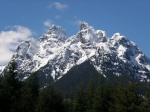
gman- Member
Page 1 of 2 • 1, 2 
 Similar topics
Similar topics» my other shape of tree- tamarind
» Tamarindus - looking for large old examples
» Tamarind from seed
» Re: my first Bonsai Tamarind (Tamarindus indica) Bonsai Progression
» tropical bonsai plants
» Tamarindus - looking for large old examples
» Tamarind from seed
» Re: my first Bonsai Tamarind (Tamarindus indica) Bonsai Progression
» tropical bonsai plants
Page 1 of 2
Permissions in this forum:
You cannot reply to topics in this forum







